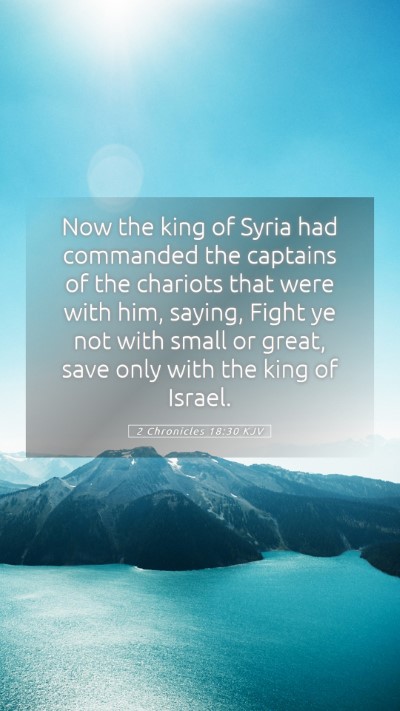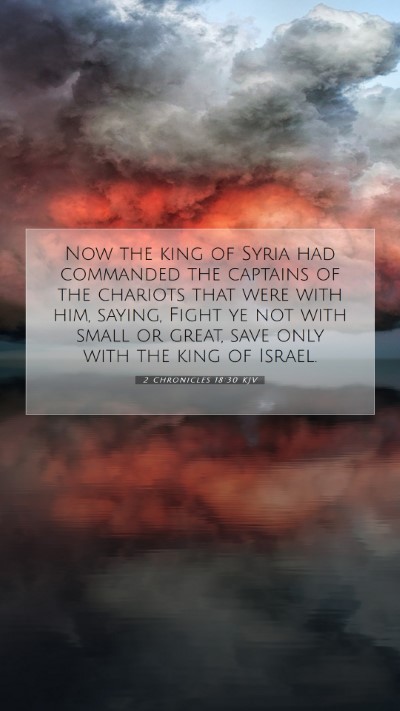Bible Verse Commentary for 2 Chronicles 18:30
Verse Reference: 2 Chronicles 18:30 (KJV) - "And the king of Israel said unto Jehoshaphat, I will disguise myself, and enter into the battle; but put thou on thy robes. So the king of Israel disguised himself, and they went into the battle."
Overview
This passage describes a pivotal moment in the story of King Ahab of Israel and King Jehoshaphat of Judah as they prepare for battle against the Arameans. Ahab's decision to disguise himself while sending Jehoshaphat, who was wearing royal attire, into battle showcases the themes of deception, fear, and the pursuit of personal safety over collective responsibility.
Meaning and Interpretation
- Deception and Fear: Ahab, aware that he is a target for the enemy, resorts to disguise to protect himself. Matthew Henry notes that this act reveals Ahab's cowardice and his willingness to endanger Jehoshaphat for his own safety.
- Leadership Responsibility: Jehoshaphat, although a good king, allows himself to be deceived by Ahab's plan, demonstrating the sometimes precarious nature of alliances (Albert Barnes). This raises questions about the integrity of leadership and the responsibilities that come with it.
- Symbolism of Robes: The robes signify kingly authority and legitimacy. Ahab’s instruction for Jehoshaphat to wear them, while he disguises himself, suggests an attempt to manipulate the perception of their roles in battle (Adam Clarke). This intrigues the dynamics of power and accountability.
- Fate of Kings: The irony in the outcome of disguises highlights the inevitability of God's will. As the story unfolds, it becomes clear that God’s plans will prevail regardless of human strategies, a theme resonant throughout scripture.
Contextual Analysis
The historical context of this verse involves the alliance between the two kings: Ahab, known for his wicked reign, and Jehoshaphat, who sought to follow God’s ways. Their decision to confront the Aramean threat together reveals the different spiritual paths each king embodies. The contrasting behaviors here provide deep insights into the nature of governance and the divine guidance that leaders should seek.
Related Biblical Themes
- The Nature of Kingship: This passage raises critical reflections on the character and morality of rulers, fitting within broader discussions found in Proverbs 16:12, which addresses righteous kings forbidding wicked actions.
- God’s Sovereignty: The unfolding events throughout this chapter ultimately emphasize God's control over human actions, illustrated in Isaiah 46:10, affirming that He declares the end from the beginning.
- Consequences of Deception: The later part of this narrative, and its resolution, link back to the unavoidable consequences of Ahab’s strategy, with themes echoing in Galatians 6:7 where it states, “God is not mocked; for whatsoever a man soweth, that shall he also reap.”
Application to Daily Life
This verse offers valuable lessons on integrity, leadership, and reliance upon God. It serves as a reminder to believers that:
- True security and wisdom stem from honesty and transparency in our actions.
- Leaders should lead by example, valuing collective responsibility over personal gain.
- Seeking God’s guidance is crucial in decision-making, especially in alliances and partnerships.
Conclusion
The account in 2 Chronicles 18:30 invites readers into an introspective moment while navigating the complexities of leadership, alliance, and faith. Understanding this scripture enriches one's biblical knowledge and enhances the pursuit of moral integrity, vital in both personal and communal contexts.
Cross References
- 1 Kings 22:30 - Similar account of Ahab's disguise and the battle.
- 2 Chronicles 19:2 - Jehu’s prophecy against Jehoshaphat for his alliances with the wicked.
- Proverbs 11:21 - Assurance that the wicked will not go unpunished.
This analysis not only elucidates the immediate narrative but also illustrates broader spiritual truths and implications for the believer today.


